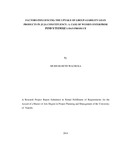| dc.description.abstract | Kenya is one of the countries with a large number of microfinance institutions which have been set-up with approaches focused on reaching the larger unbanked populations of the poor. Group-liability schemes have been utilized to reach this population with varied degrees of success. The Kenya Women Enterprise Fund is one of the schemes set up to reach this unbanked population and offers different products namely, Tuinuke and Tujiimarishe products utilize the group-liability approach. WEF is a pioneer fund which distinguishes itself from other microfinance products with its unique features of zero interest on the loans and a grace period of three months for starters. (GoK, 2009) This research study sought to assess the factors influencing the uptake of the Constituency Women Enterprise Scheme also referred to as Tuinuke loan product. The study was carried out in Juja constituency which is one of the 210 constituencies. The researcher targeted women groups registered and operating in Juja constituency. Cluster and random sampling techniques were used to identify an adequate sample of wards and women groups who were the target population for this study. A sample size of 282 respondents drawn from 19 registered women groups operating in Kilimambogo, Gatuanyaga, Murera and Githurai wards was used. Data were collected with the aid of two research assistants who took a period of about one month. The collected data was analyzed using descriptive statistics , presented in frequency tables and interpreted. The study established that the uptake of Tuinuke group-liability loan was greatly affected by the lending conditions which were quite stringent. Group factors were found to slow down group‟s progression to higher level loans while the nature and characteristics of the businesses operated by the group members directly impacted their ability to absorb higher loans. These businesses operated in slow-growth, low-return sectors of the industry that affected their ability to absorb more capital. The location of the group also influenced the uptake of the loans since some were too geographically dispersed and difficult to access. The researcher recommends an increase in the amount of loan given, an increase in the number of volunteers, training of members in business management skills and training of the group leaders in group leadership styles. Further areas of research have also been identified in this study. | en_US |

